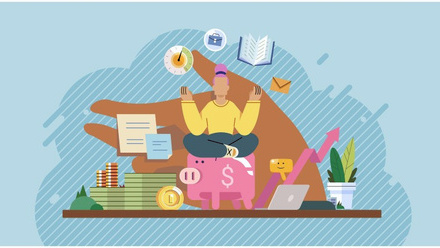Dawn’s inside track: a brave new world where financial wellbeing translates as financial survival

We all know that there is a chronic issue with savings in the UK. Figures from the Money and Pensions Service show that only 44% of UK working age adults have £500 or more in savings, and 26% have no savings at all. This lack of reserves means that people’s financial resilience is very low and any unexpected event or cost can have a significant affect.
The impact of coronavirus on jobs
The impact of coronavirus and the resulting lockdown has been far wider than any of us imagined. The government’s furlough scheme has been absolutely vital in saving jobs. However, it is only paying 80% of people’s wages up to £2,500. And that 20% difference can be a real issue for some employees.
The scheme is also set to be used by far more organisations than the government had anticipated. It originally suggested that just 10% of companies would have to use the furlough scheme. Yet, figures from the British Chambers of Commerce suggest that two-thirds of businesses will be utilising it.
On an individual level, other than being furloughed, some have experienced a cut in their hours, enforced annual leave and even, sadly, redundancy. For those without a financial security net, this can and is creating real hardship.
Just this week there have been numerous reports about the surge in the number of people using foodbanks, as well as figures from the Food Foundation highlighting that three million people have experienced hunger since the start of the outbreak because they did not have enough food.
As we all know, financial strains have knock-on consequences to our mental and physical health, such as raised anxiety and poor sleep. And the current situation is only serving to compound these issues.
All of this means that some are having to take on second jobs to make up for their fall in income or are perhaps continuing to work when feeling unwell because they cannot survive on statutory sick pay.
A brave new world
A topic we have been discussing a lot over the past few weeks is what things will be like post-coronavirus. Will we return to how things were or re-evaluate reward and benefit strategies to create a fairer society?
Just a couple of weeks ago, reward specialist Dr Duncan Brown suggested that we need to consider a more equitable, compassionate and collective approach to reward. And for me, that includes our approach to financial wellbeing.
Those fortunate enough to have accessible savings live with greater stability and reassurance that they will be able to financially weather coronavirus. Yet those without this safety net are likely to be plagued with insecurities about what the future holds.
For employers, helping employees to build financial resilience is not only a ‘nice to do’, it also makes business sense. It ensures that when the unexpected happens employees are left in control of their finances, allowing them to remain focused and productive, and ultimately better equipped to deal with life’s curve balls.
The impact of coronavirus has utterly turned our lives upside down. But once this is all over, I hope that instead of people fighting for financial survival, people will be able to embrace a sense of financial wellbeing and resilience with the support of their employer.
The author is Dawn Lewis, content editor at REBA.





